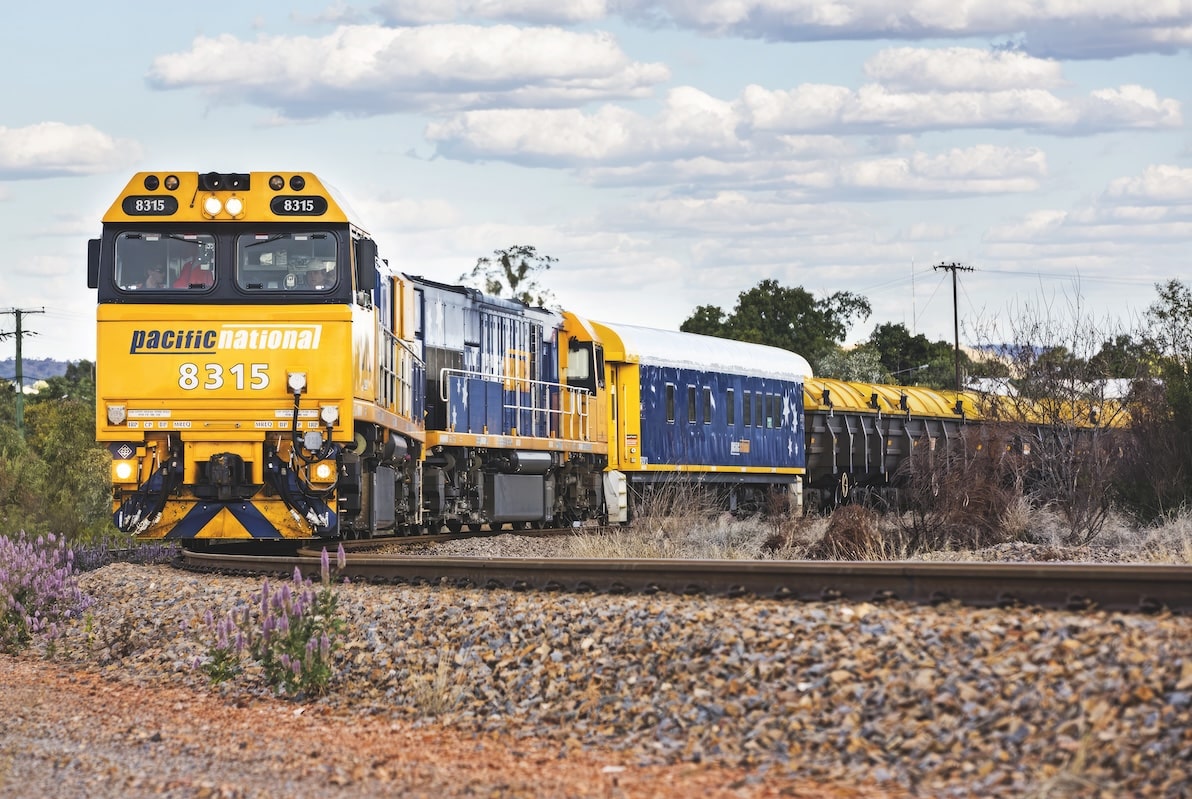Pacific National has a long history of experience helping Australia’s farmers get their grain to port.
As the largest hauler of grain and agricultural products, regional exports, and bulk goods on the eastern seaboard, Pacific National is on track to deliver a bumper harvest of grain to port for export this season.
Group executive coal and bulk Patrick O’Donnell said Pacific National has a track record of delivering what matters for its customers, with rail providing the most efficient mode of transport to move grain.
“Hauling more bulk grain by trains means fewer trucks on country roads, improving safety and reducing emissions in regional transport networks,” he said.
“Bulk commodities like grain are best hauled by trains as no other mode comes close to rail’s carrying capacity. In fact, moving 800,000 tonnes of grain on rail is the equivalent to removing more than 20,000 B-double trucks off the road network.”
The grain industry is a vital pillar of the Australian economy, delivering an average of 45 million tonnes of grain annually over the past decade and contributing an average of $15.5 billion per annum in gross value to the Australian economy.
However, high supply chain costs have a significant and direct impact on Australian grain growers and threaten the global competitiveness of the Australian grain industry.
Already facing comparatively higher costs of production, reducing supply chain costs presents a key opportunity to ensure Australian grain remains globally competitive and deliver savings for Australian growers.

GrainGrowers association, in a recent report, stated it wants to see greater scalable capacity in the supply chain. As annual grain production fluctuates, the organisation believes scalability is important.
The past three successive record harvests highlight the limitations of the supply chain to export grain during key export windows.
Exporting Australia’s grain as quickly as possible using least cost pathways following harvest is critical for capturing high international prices as Australia’s seasonal counter cyclicality presents an opportunity for Australian exporters to sell grain to international markets in times of reduced global supply.
O’Donnell said Pacific National has deep and unrivalled experience, expertise and capacity in hauling large volumes of grain safely and efficiently.
“During this season’s bumper harvest, Pacific National is loading grain at more than 100 sites and running grain services throughout New South Wales and Victoria,” he said.
“We’re able to call on the resources of 300 highly trained and skilled essential frontline freight workers and a rolling stock fleet of more than 150 locomotives and 1200 grain hopper wagons.”
O’Donnell said Pacific National has also increased the tonnage per train to improve service efficiency and value for its customers this harvest season.

“We’ve reconfigured our fleet of locomotives to deliver more for our customers and ensure we can move more grain from paddock to port,” he said.
“We have increased the number of wagons on northern New South Wales services by an additional 30 per cent from 48 to 62 wagons, allowing us to run trains that span almost one kilometre in length.
“And in Victoria we’ve increased train capacity to a number of sites by 20 per cent from 40 to 50 wagons, allowing us to haul 3,000 tonnes of grain each trip.”
O’Donnell said as Australia’s largest private rail freight operator, Pacific National recognises the crucial role the agricultural sector plays in advancing the Australian economy.
“As the country’s leading grain and agricultural freight operator, Pacific National provides freight solutions that support productivity for Australia’s leading agribusinesses,” he said.
“Our expansive network gives us an unparalleled advantage, with a system of terminals and ports in every Australian mainland capital city facilitating seamless, market oriented, supply chains.”
With Pacific National’s expansive operational footprint, the business has been working with grain customers to ensure rail is geared up to meet their capacity requirements this season.
“With the strong grain harvest on the horizon, we’ve been working around the clock to ensure our fleet is optimised to deliver for customers and ensure we haul more volumes to port for export,” he said.
O’Donnell said Pacific National’s heritage dated all the way back to 1855 and hauling grain was deeply ingrained in the company’s DNA.
“The rail sector is inextricably connected to producers and we’re proud as a business to be supporting the grain industry,” he said.
“The country’s regional grain lines are the backbone connecting paddocks to port, and it’s incredibly important they’re retained to ensure this valuable commodity can continue to be moved now and in future seasons.
“One of the best ways for government to reduce carbon emissions, diesel particulate matter, road accidents and fatalities, noise, traffic congestion and road ‘wear and tear’ is to support more grain on rail.”




Let’s get more of the grain lines reopened and more of the grain on rail it makes commercial and social and environmental sense, why is Australia so slow to make these changes?